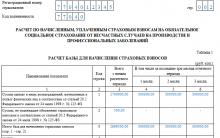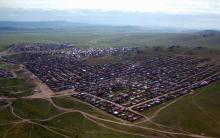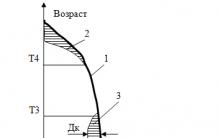8 Among the most sought-after bank employees, tellers firmly occupy leading positions. Due to the specific nature of their activities, it is important for these workers not only to be able to clearly and professionally document financial transactions, process competently and quickly electronic information, but also provide qualified and friendly service to bank clients. Therefore, the employer needs employees who can meet the demands placed on them. qualification requirements.
Joint Stock commercial bank"Talisman" JSCB "Talisman"
10/30/2006 N 21 I approve
———- ——— Chairman of the Board
(date) (number) ————————-
(manager position)
Moscow
Mironov O.K. Mironov
——— ———————
30.10.2006
————
(date)
Bank teller
1. General provisions
1.1. This job description defines the duties, rights and responsibilities of a bank teller.
1.2. The operator belongs to the category of specialists and is hired and dismissed by order of the Chairman of the Bank's Board on the recommendation of the head of the bank's HR department.
1.3. The operator reports directly to the head of the bank's operations department.
1.4. During the operator’s absence, his duties are performed by an employee appointed by order of the Chairman of the Bank’s Board.
1.5. In his activities, the operator is guided by: federal laws, regulatory documents and instructions of the Ministry of Finance of Russia and the Bank of Russia, orders and instructions of the Chairman of the Board of the bank and the head of the operational department, the charter of the bank, internal labor regulations, and this job description.
2. Qualification requirements
2.1. A person with secondary education is appointed to the position of operator vocational education in the specialty “Bank Operator”, as well as work experience in a similar position for at least two years or higher professional education and work experience in the specialty for at least one year.
2.2. The operator must know:
- legislative and regulations concerning banking;
— rules of settlement relations and principles accounting in the bank;
— rules for receiving and processing payment and cash documents;
— plan and correspondence of bank accounts and the procedure for standard postings;
— the procedure for opening and maintaining bank accounts for individuals and legal entities;
— the procedure for working with correspondent, settlement, transit and loan accounts;
- rules for maintaining cash registers and foreign exchange transactions;
— orders and departmental instructions on the bank’s activities;
— teaching materials by organization operational work in the bank;
- forms and methods financial statements in its direction;
— organization of document flow for accounting banking operations;
— computer program“Operator - day”;
— basic legislation on labor, labor protection and safety;
— local regulations of the organization;
— technology for processing documents using electronic computing and office equipment;
— computer methods for collecting, storing and processing information and rules for using modern information technologies.
3. Main functions
3.1. The operator is responsible for processing payment and cash documents; on opening, maintaining and closing accounts, calculating interest on accounts; on registration of transactions with currency, as well as on conducting transactions with plastic cards and bank safes.
4. Job responsibilities
The operator is obliged:
4.1. Prepare bank documents in accordance with the procedure established by law Russian Federation, instructions of the Ministry of Finance of Russia and the Bank of Russia.
4.2. Serve depositors and bank clients, including drawing up agreements, powers of attorney, and issuing savings books.
4.3. Open, maintain and close current accounts of individuals and legal entities.
4.4. In the prescribed manner and on schedule, accrue interest on accounts and make payments from depositors’ accounts.
4.5. Carry out non-cash transactions for crediting and debiting cash.
4.6. Conduct transactions with deposits, plastic cards, bank safes.
4.7. Follow the document flow schedule and customer service schedule for transactions.
4.8. Charge clients a commission for services provided in accordance with the tariffs for paid services.
4.9. Maintain client files and create a register of client payments.
4.10. Generate daily bank reports and prepare data on your area of work for the preparation of final reports.
4.11. Participate in the creation and maintenance of a database of payment documents.
4.12. Ensure the safety of entrusted financial documents.
4.13. Provide bank managers and clients with reliable information on their area of work.
4.14. Advise depositors and bank clients on the choice of deposits, interest rates, tariffs and services provided by the bank.
4.15. If necessary, advise specialists of the bank and its branches on issues related to its competence.
The operator has the right:
5.1. Do not accept for execution documents on those transactions that violate current legislation, as well as the established procedure for performing and recording transactions.
5.2. Participate in the development of forms primary documents, used to process banking transactions for which standard forms are not provided.
5.3. Submit proposals for improvement of work related to the duties provided for in this job description for management’s consideration.
5.4. Undergo retraining and advanced training in the manner established by labor legislation and local regulations jar.
5.5. Get acquainted with the draft decisions of the bank’s management relating to it professional activity.
5.6. Request and receive from the head of the department and other bank specialists documents, information, including software necessary to perform job duties.
5.7. Inform your immediate supervisor about all shortcomings identified during the work process and make proposals for their elimination.
5.8. Interact with all bank services on issues of your professional activities, including the legal department and the bank’s security service.
6. Responsibility
The operator is responsible for:
6.1. For poor quality and untimely fulfillment of the duties assigned to him by the job description within the limits determined by the current labor legislation of the Russian Federation.
6.2. For causing material damage within the limits determined by the current legislation of the Russian Federation.
6.3. For violation of labor discipline, internal labor regulations, labor protection rules and regulations, safety precautions and fire protection.
6.4. For other offenses committed in the course of their activities - within the limits determined by the current administrative, criminal and civil law Russian Federation.
7. Procedure for reviewing job descriptions
7.1. The job description is reviewed, amended and supplemented as necessary, but at least once every five years.
7.2. All employees who are subject to this instruction are familiarized with the order to make changes (additions) to the job description against signature.
The job description was developed in accordance with the order of the Chairman of the Board of the Bank dated October 16, 2006 N 134.
Head of HR Department Andronova E.P. Andronova
—————————— ———- ———————
(head of HR department) (signature) (signature transcript)
I have read this job description. One copy
I received it in my hands and undertake to keep it in my workplace
Pirogova I.N. Pirogov
——— ———————
(signature) (signature decryption)
03.11.2006
————————————————————————-
Turn of the last sheet
———————————-¬
¦ In this job description ¦
¦ instructions are numbered, ¦
¦ laced and sealed ¦
¦ 3 (three) sheets ¦
¦ ——— ¦
¦ ¦
¦ Chairman of the Board ¦
¦ JSCB "Talisman" ¦
¦ Mironov O.K. Mironov ¦
¦ ——— ¦
¦ ¦
¦ 10/30/2006 ¦
L———————————-
Head of the Legal Department Shvetsova A.E. Shvetsova
———————————— ———- ———————
(manager, endorsing document) (signature) (signature transcript)
The cashier operator of a banking institution is a specialist in servicing customer flow. It carries out transactions with funds of individuals and legal entities. The work is more technical than intellectual, and requires great care, perseverance and accurate knowledge of job descriptions and regulations of the Central Bank of the Russian Federation. The list of functions of a cashier-operator in a bank has long gone beyond the scope of “issuing and receiving money.” Now he must monitor the status of clients’ bank accounts, communicate with visitors, conduct various operations V different currencies, check the authenticity of signatures and the correctness of orders and other payment documents, transfer funds in cash and non-cash methods, open, replenish, close deposits, accept, issue or exchange currency. The cashier operator is required to report on all financial transactions, hand over accepted cash to the cash desk, and formalize the relevant cash documents.
Salary of a cashier at a bank.
The average salary is about 30,000 rubles. Most high level payments in megacities: from 40,000 rubles. In the regions, tellers receive from 12,000 rubles. Income consists of:
- Salary. This is a fixed fee, paid every month. They will not pay less than this established amount.
- Bonus payments. This is a variable reward amount. It is paid over a set period (monthly or quarterly). The bonus depends on the fulfillment of the set plans for the entire office, since operations officers usually do not have individual plans. It is paid at the discretion of management.
Requirements for a bank teller:
- Higher education. This is a mandatory requirement for applying for a job at a bank. The specialty should preferably be a specialized one: economics or accounting.
- Experience. Work experience may be required, but sometimes they can hire you without work experience in a similar position with mandatory training at the bank. Training may be paid, or it may be free.
- Knowledge of foreign languages. If the bank serves foreign clients, then knowledge of languages will be a mandatory requirement so that the specialist can express himself freely and understand what the client wants. In ordinary banks, this quality is optional, but encouraged.
- Knowledge of Central Bank regulations and cash management rules. Since the operator works with cash, then knowledge of all provisions and instructions is necessary. The bank cashier also services bank accounts, monitors the movements of funds on them, and this is all based on the provisions of the Central Bank.
- Confident PC user. Knowledge of standard Office programs, including word and excel, will assist in rapid maintenance and reporting. Typing speed and literacy are also needed, because you will have to fill out a lot of documents and check them.
- Cash handling skills. Working with money is one of the most difficult, because you need to clearly distinguish between real and counterfeit bills. Sometimes you have to work with large sums, so a quick count and instant identification of authenticity will come in handy.
- Availability of currency certificates. The bank can accept certificates issued by other banks and allow a specialist to work with foreign currency. But most often, the cashier operator must confirm his knowledge and receive a certificate from the bank in which he works.
Responsibilities of the cashier:
- Customer service. The operator conducts all financial transactions and advises clients. Service should be polite and competent, because this gives the impression of the bank.
- Opening and servicing of accounts and deposits. The operator is responsible for opening current accounts for individuals and current accounts for entrepreneurs. He is also involved in the opening and further servicing of deposits.
- Carrying out incoming and outgoing transactions. The cashier-operator prepares cash documents for depositing and withdrawing funds. All operations must be carried out in accordance with the established rules of the bank and the Central Bank of the Russian Federation.
- Carrying out money transfers. Money transfers are carried out through payment services. The operator must accurately fill out all documents so that the payment arrives without problems.
- Client consultation. The cashier operator must be able to advise clients on almost all types of products. To do this, you need to know the main aspects of each service. If the product is too complex, or the client requires explanation of the subtleties, then he should be politely redirected to the appropriate specialists.
- Cross-selling. All bank products are connected. Cross-selling involves offering additional products to the main product. For example, if a client opens a deposit, he can be offered to issue a bank card in order to transfer interest there.
- Working with currency. The operator must be able to recognize the authenticity of banknotes and conduct currency transactions in accordance with the rules.
- Acceptance and withdrawal of cash. Clients carry out various operations: deposit cash into accounts, withdraw money, open and close deposits, so the operator must count quickly and correctly so as not to make mistakes. He bears financial responsibility for all shortages and excesses.
- Card transactions. The operator issues new cards, closes them at the request of clients, makes statements on cards and other operations.
- Cash balance at the end of the day, collection of funds. All cash collected during the day is subject to recalculation, collection from the machine and transfer to the main cash desk of the bank. All funds must correspond to the documents of receipt and expenditure.
A cashier-operator is a person who works in a bank or in the postal system, in stores. The functional responsibilities of an operator are related to the presence of financial responsibility.
Training for those wishing to work as cashiers
Of course, working at a cash register does not require fundamental knowledge at the higher education level. Nowadays, specialized skills are provided by cashier-operator courses and vocational schools, the program of which includes training for cashiers.
What does the training of an employee working with money include? Firstly, graduates must have a good knowledge of mathematics, namely, be able to quickly perform basic mathematical operations (multiplication, division, subtraction, summation) in their heads or on a calculator. Communication skills with people are also important for this profession, namely sociability, politeness, and developed vocabulary.
Besides all this, probably the main task educational institution- this is to convey to the student (course attendee) the basics of accounting, the nomenclature of accounts, etc. The cashier-operator must be able to work efficiently with cash (correctly count, pack, identify counterfeit banknotes). The training of a professional cashier cannot last a week or two, as is done in some banks during an internship. The optimal period for learning basic skills is several months.
What does a cashier-operator do?
Many people think that working with money is very simple. These people are mistaken because such work, especially in intensive work (for example, as in modern grocery supermarkets) is hard work that should be well paid.

The responsibilities of a cashier-operator are approved in the Standard Job Description. First, let's look at what a bank teller does. Probably, most often he accepts various payments (utility, budget, to legal entities). In addition, the functionality bank employee money management includes:
- working with a POS terminal (withdrawing and replenishing funds for bank cards clients);
- transactions for the purchase and sale of currency (dollars, euros and other foreign monetary units);
- acceptance and payment of money transfers in national and foreign currency;
- opening and servicing deposits, current accounts, etc.;
- working with old banknotes;
- work with software systems and reporting, cash management.
Responsibilities of a cashier-operator in a supermarket and pawnshop
Is working with money difficult or easy? Probably, every novice cashier has no idea how responsibly one should approach the performance of one’s duties. In each industry, the work of a cashier-operator has its own specifics. It will be difficult for a person who worked at a cash register in a banking institution to get used to working at a supermarket cash register. Let's analyze the functionality of a supermarket cashier. From the point of view of an ordinary client - nothing complicated. Well, in reality it’s not that simple. A supermarket employee must know customer service standards; additional packaging requirements various types goods at the checkout; have a clear understanding of the store's software package.

When a customer approaches the checkout, the operator usually scans all items using a barcode. But even here there are exceptions, because, for example, the store’s own baked goods are not packaged. Customers take a pie or some other product, put it in a special bag and often do it incorrectly. The cashier must check all this.
The responsibilities of a cashier-operator in a pawnshop are generally specific due to the level of responsibility. The fact is that unscrupulous clients may bring counterfeit gold instead. The employee must use special knowledge and observation to identify this. In addition, the pawnbroker knows how to work with special scales and determine the sample of metal without any marking.
Job "cashier-operator": how to find vacancies and get a job?
Finding any job is difficult, especially if a person does not have a wide circle of acquaintances. The most basic place where those wishing to find a job go is the state employment center. Vacancies for cashiers are usually found frequently, because quite a lot of stores, bank branches, etc. are now opening. The majority of employers are looking for labor precisely through employment centers, because government agency will always refer for an interview a person who meets all the basic qualification requirements for the profession.
In addition, many read employment sites on the Internet and purchase special thematic newspapers, which also publish employer vacancies.

What details are important for the employer?
For many employers, it doesn’t really matter what a person graduated from: a vocational school, a cashier-operator course, or received a profession from a completely different industry. Employers who are thinking about the prospects for the development of their company will definitely pay attention to a self-confident, competent person who has experience working with people and has developed the ability to sell products and offer the client something additional.
A professional is not an employee who has memorized a work algorithm, but a person who loves and knows how to develop. Of course, anyone who has completed the course can perform the duties of a cashier-operator, but not everyone is destined to become a successful cashier.
Which every client of the institution has to meet financial sector. It is on his behavior and manner of conversation with visitors, as well as the speed and quality of service, that the impression received about the bank itself, its stability indicators and rating on financial market. It largely depends on this specialist whether the client will turn to this particular specialist. financial institution again or not.
Operator-cashier - enough However, among specialists in this category there is a strong main reason for the occurrence of such a negative fact - low wages. However, there is also a positive aspect of constantly changing personnel at this level - moving up the career ladder.
Basic rules for an operator

The basic rules of a cashier-operator include: providing answers to all their questions, maintaining accounts with making appropriate changes to the database of the banking institution. The work of these specialists requires enormous effort, since constant contact with people can cause certain psychological stress. We must not forget about the fact that they often have irregular work schedules due to large volumes of document flow; their responsibilities also include maintaining databases up to date. It is worth mentioning the high financial responsibility.
The organization of the work of a banking institution depends on the behavior and restraint of the cashier, so these employees must be calm and focused. Unfortunately, not all clients are friendly when contacted, and this leads to scandals in the operating room.
To work in this place, those who wish to do so need to receive special education; in extreme cases, they need to complete a cashier-operator course. When carrying out transactions with foreign currency You must obtain a special currency certificate. Also, the cashier operator must know the various forms of both cash and bank documents with the order of their registration. The specialist must have knowledge of the current legislation regarding management and be able to carry out operations in the field securities and cash, correctly use the procedure for generating cash register reports and the corresponding order journals, have skills in working with computer equipment and relevant software.

Cashier specialization
Most often, cashiers' work area is related to cash circulation. However, there are specialists responsible for all other operations associated with it.
Successful career as a cashier
Cashier operator is a position with which a young specialist can successfully develop his career in institutions. It was modern managers who began their careers as cashiers in banks. Also, young professionals holding the position of operator have the opportunity to combine work with study to obtain a higher education.











Carrying out an inventory
Ulyukaev, Navka and Patrushev
Income tax refund for treatment: registration procedure and calculation of the deduction amount
Import substitution - what is it?
OSAGO minimum insurance period